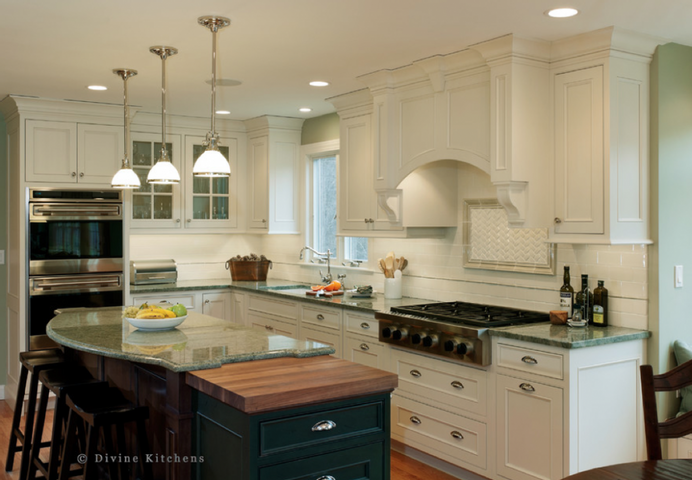5 Alternatives to Granite Countertops

There are many stylish and affordable alternatives to granite countertops. Here we explore 5 options from butcher block to quartz, and everything in between.
1. Butcher Block

Pros: Butcher block countertops provide a natural warmth and texture to your kitchen and are an affordable option in comparison to their stone counterparts. They are also naturally anti-bacterial and offer a quieter cutting surface than many other materials.
Cons: Although butcher block is relatively low-maintenance, they do require bi-annual sanding and oiling to protect the wood. In addition, this material is prone to scuffing and most kitchen experts suggest using a cutting board instead of cutting directly on the wood. You should also note that water will stain the wood, so be careful to keep the areas around the sink dry and clean up spills as quickly as possible.
Concrete
Pros: This industrial looking surface is heat-resistance and is durable enough to stand up against everyday wear and tear. If you’re looking to make your kitchen your own, this material is easily customizable and you can choose various stone, glass, quartz, or slate pigments for it. Keep in mind that customization will make the price vary a bit depending on the materials you choose.
Cons: Concrete countertops must be sealed to make them non-porous and heat and stain resistant. You also need to continue to reseal them every 1-3 years after the initial installation.
Quartz
Pros: One of the most durable countertop selections, quartz countertops offer you limitless options in terms of their appearance. They are also heat and stain resistant and their non-porous quality makes them a great option to deter stains as well as mold and bacteria. In addition, their durability is top-notch making them more forgiving than concrete and granite, so you won’t have to worry about them cracking or chipping as easily.
Cons: This engineered stone is more contemporary, so its look isn’t always favored for those that prefer a more natural appearance. In addition, this material is not as heat resistant as other materials, so you must use caution with hot pans.
Corian
Pros: This solid surface countertop is becoming more and more popular in kitchens today. It’s available in matte satin, semi gloss, and high gloss and comes in a variety of colors and patterns. It’s possible to order pre-cut materials, so you won’t need to worry about visible seams as with other materials. It is also non-porous and stain resistant, making it a breeze to clean.
Cons: Corian does scratch easily and can get damaged from heat, so one should take caution with hot pots and pans. It is also a costly option. Although it isn’t as high of a price tag as with granite countertops, it is more expensive than other materials.
Ceramic Tile
Pros: This popular material will give your kitchen an elegant look. You can completely customize its appearance to your liking, and you can use different colored and patterned tiles to give your space a unique look. It is also relatively inexpensive and damaged tiles are replaceable. This material is also heat and stain resistant.
Cons: One of the major cons with ceramic tile is that the grout in between the tiles is prone to staining and can be hard to keep clean. In addition, the surface is uneven and is prone to chipping and cracking.
About the Business
Have a question? Ask the experts!
Send your question

